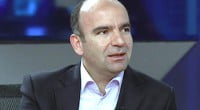Will Erdoğan succeed in wresting away the reins of religion from civilian hands?

Date posted: January 26, 2015
I am going to talk about a situation similar to the process by which the tools of production become state possessions. These are concepts far removed not only from Western culture but from socialist ideologies as well. After all, what we are talking about here is not nationalization, but rather the transitioning of cultural arenas that are directly linked to the society — and that the society has even created on its own — into state property.
It is a situation one could aptly characterize as “expropriation” or “confiscation,” and it concerns the arena of religion, which ought to of course be a free arena for individuals and society, but which the state, with Recep Tayyip Erdoğan at its helm, is busy taking over in a rapid and systematic manner. Yes, religion in Turkey — along with all of its various manifestations and institutions — is being expropriated by the state.
The real reason behind the war Erdoğan has undertaken against the Gülen movement, and in truth against all religious sects, is this desire to nationalize religion. And in trying to nationalize religion, Erdoğan is leaving nothing behind in the way of any civil space; he wields all the tools and power of the state against those who would resist his attempts, essentially trying to wipe them out.
During his visits to Djibouti and Somalia, Erdoğan officially asked the leaders of those countries to take steps to shut down the schools opened by the Gülen movement in those countries. No matter which angle you look at this from, it’s a strange request. Not only this, but Erdoğan has promised that in return for getting the Gülen schools in those countries shut down, he will replace them with Turkish state schools.
In fact, this latest push from Erdoğan is only the newest example of systematic efforts to nationalize religion, efforts that are now transcending Turkish borders. What we are seeing is the state facing off against a Turkish-funded civil society organization’s efforts in foreign countries, with the president of Turkey directly overseeing this competition.
The Gülen movement is unified with certain religious motifs and has successfully managed to appeal to the entire world with its peaceful and humanist agenda. The Turkish schools opened all throughout the world by the Gülen movement are called by many, because of this, “peace bridges.” The truth is that the Gülen movement, which comes out of the Muslim world as a peaceful, democratic and freedom-loving movement, is a unique and powerful antidote to the kind of terror seen from the Islamic State in Iraq and the Levant (ISIL).
The Gülen schools do not missionize. They are used by all sorts of people from different religions and belief sets. Not only this, but these schools are always supervised by the authorities in the countries in which they are located. And since they are especially driven by strong belief and dedication, these schools are able to establish very successful educational atmospheres and generally wind up being some of the most popular schools in the places they are located.
In the meantime, in Turkey, Erdoğan is using the religious lessons that are a part of both imam-hatip schools and regular state schools to compete with the education offered by religious sects, all this while the battle is being waged quite openly against the Turkish schools outside Turkey’s borders. In the end, though, there is a barrier that will be impassable for him. Regular and religious education offered in Turkey is of a very low quality. The same goes for schools opened by the Turkish state outside of Turkish borders, which simply do not possess the strength to actually compete with schools opened by civil initiatives and civil society organizations.
By attempting to nationalize the various manifestations of religion in his state, Erdoğan is trying to transform his ruling party into a perpetual-motion motor, one that runs on religious energy created by society. Will he be successful in this? It seems impossible, since the interests of state power and those of civil society are completely incompatible. There will always be a civilian arena of religion that exists out of the reach of the state, and society will continue — as it has through the ages — to create its own solidarity under the shelter provided by this civil religious umbrella.
In the meantime, attempts at nationalization only lead to politicization, and politicization leads to the creation of more conflict. Despite Erdoğan’s extreme efforts and the fear he wields with his state-controlled tools, civil religion has shown strong resistance. And in the end, we are witnessing that the state is unable to take firm control of the reins of religion, as the war being carried out by political Islam on civil Islam wages on.
Source: Today's Zaman , January 26, 2015
Tags: Defamation of Hizmet | Democracy | Freedoms | Turkey |
























